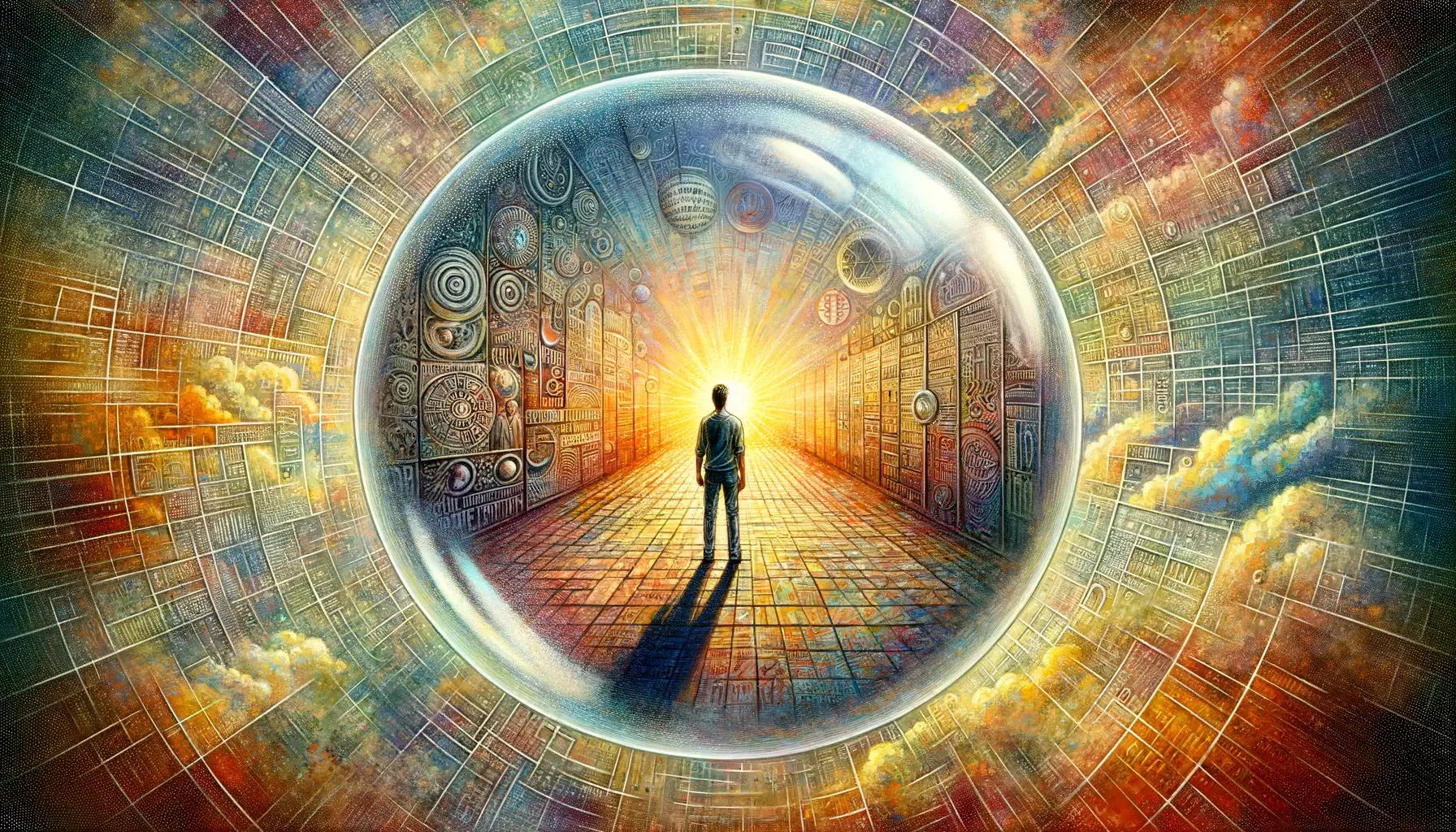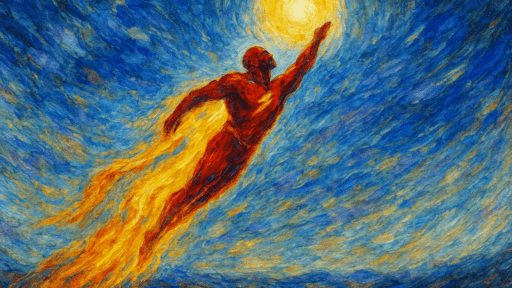Part 3 of 5 of My Journey From Faith.
“I was so afraid of doubt that I never learned to wrestle with mystery.”
Straight out of the gates, Christianity offers profound comfort and hope. An all-knowing, all-loving, all-powerful God who loves you like a father, has a specific plan for your life, and has prepared a place for you with him in heaven. Stack that up at face value against other options, and it fares well.
No doubt the deal is particularly sweetened when you consider the alternative is literally hell.
But truth be told, when I began my Christian journey, hell was not yet a serious consideration of my faith. I acknowledged it conceptually, but it was more of a loose thread I didn’t pull very hard.
As I progressed in my “personal relationship” with God, I became deeply engaged in Christian theology. I loved exploring concepts like justification, sanctification, predestination, covenants, dispensationalism, soteriology, eschatology…you get the idea. It was a buffet of Christian nerdery—and I was very well fed.
Moreover, I loved debating and convincing others that these things mattered.
I enjoyed the idea of a systematic theology that could be understood in the broader context of history and science. I became an ardent proponent of Christian apologetics and loved learning newer and deeper ways to affirm why Jesus Christ was the way, the truth, and the life.
One of the problems with this approach to God is that it can quickly become academic. Instead of a statement of faith, God becomes a statement of fact. And so the idea of hell and people going there becomes a bullet point on a fact sheet.
All that to say, I also had a very pragmatic affection for the bible…or at least parts of the bible. I devoured hundreds of hours of sermons and thousands of pages of exegesis. I committed scripture to memory and did my best to hear God’s voice in my everyday life.
I was on fire for the lord and remained so for many years. I had an unrelenting appetite for the things of God. No doubt I enjoyed the recognition I received from my Christian peers. But an even bigger motivator was knowing the truth; the sense of being “right” in a world full of wrong.
An essential tenet of Christianity, and especially evangelical Christianity, is the notion that we are saved by faith, not our good deeds. When the day of judgment comes there is only one way to avoid receiving the wages of our sin. Jesus stands in our place and we are justified before God by our faith in Him. This is the grace of God.
The question, then, is: “How do I get Jesus to take my place?”
There are many paths through the bible to arrive at this answer. But I believe some of the clearest words from scripture are in the oft-quoted John 3:16:
“For God so loved the world that he gave his one and only Son, that whoever believes in him shall not perish but have eternal life.”
Belief in Christ sounds simple enough. But as they say, the devil is in the details.
Maybe you believe in Jesus, but who (specifically) do you say that Jesus is? How much belief constitutes sufficient belief? How much right or wrong belief is acceptable?
As Pontius Pilate asked in John 18:38, “What is truth?”
I often used to say that I wanted to go wherever the truth led, even if that meant away from Christianity. However, I really only made this proclamation as a believer entrenched in a place of absolute certainty that Christianity was the only possible outcome of critical thought.
One key problem that emerged was that the deeper I got into theology, church life, and even working in Christian ministry—the more I excluded myself from secular thought and experiences. “In the world, not of the world” was an expression that was often repeated.
In retrospect, my wife and I call it life in the bubble.
This “bubble” is an echo chamber of thought and ideas. Almost any theology can add up nicely in the context of specific interpretations of scripture and history. Every personal experience is filtered through the lens of faith. And unwavering trust is placed in authority figures who are often treated as if they are beyond reproach. In many ways, I often allowed people I considered smarter than me to think on my behalf.
The very nature of the bubble makes it a fertile environment to undergo transformation. My worldview was cultivated exclusively by Christian faith and culture for nearly a decade. In life’s golden hours, it gives you boundless confidence in the providence of God. Amidst life’s storms, it provides refuge and hope.
Living inside this bubble turns life into a double-sided coin. No matter the outcome, God is in control.
Life in the bubble demystifies the supernatural and turns God into a subject that can be mastered.
I called it a personal relationship, but it more closely resembled a library of spiritual knowledge.
At some point faith became fact. God became math. People became projects.
I had to get out of the bubble.
During this period, my wife and I volunteered with high school students at our church. Every week we’d meet at the church, have praise and worship time with a band, listen to a sermon, and then discuss the message with the kids. We did this for nearly 5 years—literally watching these kids grow up.
On one of these evenings, I had what turned out to be one of my first steps away from Christianity. But in almost every way—I perceived it as a step toward more authentic religion and relationship.
There’s a phase of faith that some people never depart where they become a walking list of things they don’t do.
I was tired of telling the kids to not drink. Not to have sex. Not to lust. Not to watch porn. We talked a lot about Jesus being a friend, but he really felt more like a warden.
Moreover, I was tired of claiming my relationship with Jesus was so personal. It was just something from the echo chamber. I didn’t see him. I didn’t hear him. Left to my devices, I never would have described my relationship with God in that way.
It was an act of faith for me to believe, but my so-called encounters with God were more about aligning my life and thoughts up with a proper interpretation of the scriptures. We were essentially teaching these kids how to act like Christians—how to have the right answers for the God test.
I was so afraid of doubt that I had never learned to wrestle with mystery.
“Why do you think God loves you?” I asked the kids.
Silence.
“God’s love is a mystery,” I said. “Jesus humbling himself to become a man and die for your sins isn’t an act of obligation. In fact, it doesn’t really make any sense when you think about how puny we are in comparison to the creator of the universe. That’s love. That’s grace. And that’s a mystery.”
I hadn’t rehearsed or planned to say this. I hadn’t even ever articulated it that way before. It was just an outburst from a growing sense of wonder.
There was a long silence and confused faces. But it still had that christan-y ring of truth to it, so there wasn’t much follow-up. But the truth was that I had stirred something within myself.
It was exhausting trying to make life fit together like a puzzle. I was tired of fact-checking everyone’s beliefs. I was tired of having all the answers to life’s biggest questions. But most importantly, I was tired of the answers themselves.
I was turning into someone I didn’t want to be. Surely this isn’t why Jesus died for my sins. There had to be something more.
The more I started to accept mystery, the less value I placed on the purity of my theology.
I had popped the bubble.




